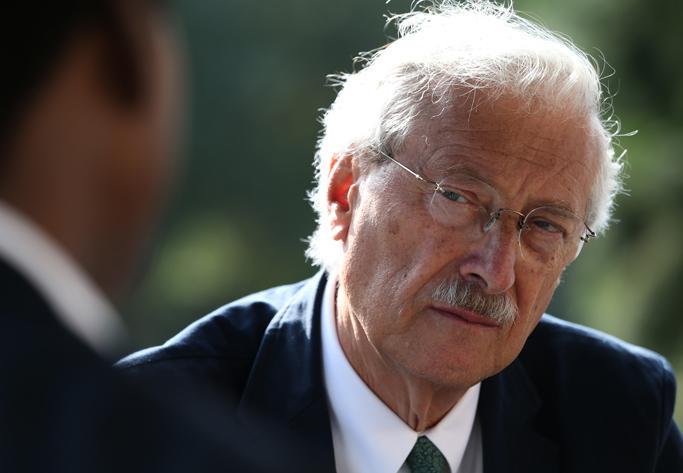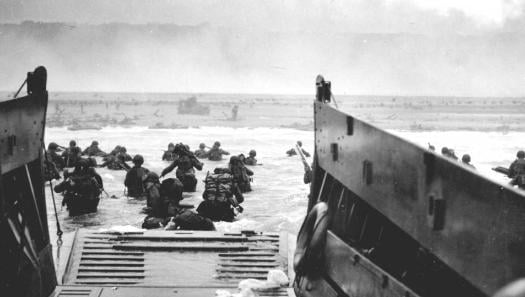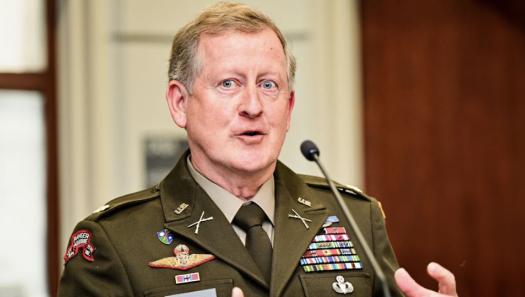WeSalute Awards
HeroVet: Dr. Skip Burkle, Vietnam Veteran, Physician, and Humanitarian

He was 28 years old, the Senior Resident in Pediatrics at Yale. He was married with three very young children. Life was hectic. Life was good. Then he was drafted.
It was on July 7, 1968, the bloodiest year of America’s involvement in Vietnam, that Frederick M. Burkle, known to all as Skip, entered the service. Two weeks later, Lieutenant Burkle found himself in Vietnam at Delta Med, a Forward Casualty Receiving Facility for the 3rd Marine Division in Dong Ha. He was six miles from the Demilitarized Zone.
On his first night there, Skip Burkle knew his life had changed forever. "It was chaotically busy," he recalls from his home in Baltimore, Maryland, where he is Visiting Professor and Senior Scholar at The Center for International Emergency, Disaster & Refugee Studies at the Johns Hopkins University Medical Institutions. "I stumbled about to find a place to sleep. I felt totally out of place, awkward and in the way. I was given my first set of camouflage fatigues off a wounded Marine. His blood-stained name tag remained on them."
"That night, exhausted, soaking wet with sweat, I somehow fell asleep in a bunker, on a cot closely lined up next to a dozen others. I never felt so alone. Soon after drifting off into some vague state of sleep, we were abruptly awakened by the roar of choppers landing immediately outside, and by fine pellets of sand and gravel propelled like shrapnel through the cracks in the bunker.
"I had no idea what was happening. I got up and followed the others. In the triage bunker, what seemed to be pandemonium, with the incessant roar of the chopper engines, with dust flying all around, was in fact almost a symphony of coordinated activity."
"I stood there, transfixed, recognizing that I had to do a tracheostomy. I could only utter, ‘We need a surgeon here.’ In milliseconds, without a word being said, a corpsman sliced open the skin on the bloody neck and trachea and expertly forced a tube into the Marine's airway. A surgical drape was rapidly placed over the man's face and his litter was quickly removed from the triage entrance and onto a chopper hovering two feet off the pad. I later learned it took him to a hospital ship about 30 minutes away in the South China Sea.
"Almost total silence returned in what seemed to be only seconds from when I first heard the arriving choppers. I stood mute, as corpsmen worked feverishly around me, cleaning up, hosing water to wash the blood into a drain around my feet. I was neither noticed nor needed."
Primitive Arrangements
Mortar and artillery rounds pounded Dong Ha almost every day. It was a rare event when Delta Med didn’t have fresh casualties. Much of the war in I Corps, Skip quickly learned, was fought at night. Which meant that he and his fellow MDs and corpsmen would be up all night, triaging, operating, working with what they had to save the savaged bodies medevacked in often moments after they’d been hit.
The practice of medicine at Delta Med was "a real culture shock," Skip reflects. Because his beleaguered band had little in the way of diagnostic tools, they had to learn to diagnose unusual illnesses like plague, scurvy, and beriberi with their eyes and ears. Only one of their 21 nurses, who had only the rudiments of nursing skills, even knew the world was round. Saving Viet Nam from communism was never part of their consciousness.
"At Yale, we had everything a doctor could want," Skip says. "At Dong Ha, we had to scrounge. We had few of the conveniences of modern medicine: the first surgical pack I opened contained sulfur powder, which had not been used since the Second World War, to treat wounds before the advent of antibiotics.”He implored colleagues from Yale to send aid boxes of special antibiotics and packages of delicate needles for children to bolster the supplies Delta Med was not able to get through regular channels.
Despite the almost primitive conditions at Dong Ha, he says, "We saved a lot of lives. All of us were draftees, a bit unruly, somewhat of a rebel bunch. We pulled a lot of pranks to stay sane. But I never saw medicine practiced so well."
X Marks the Spot
Delta Med was a group of ten to twelve bunkers, mostly small wards and treatment rooms with one operating theater. Some were built below ground, where casualties could be treated when the compound was under fire. The operating bunker was patched over in hundreds of places where it had been hit by shrapnel. A 10-foot thick blast wall filled with dirt towered above the cramped buildings inside. The chopper pad was immediately outside the triage bunker entrance.
The blast wall, with a big red cross painted on each side, was itself a target. Two months after he arrived, Delta Med took direct hits from artillery based in hidden bunkers in the mountainsides of North Vietnam. "We had about 12 killed and an equal number wounded," Skip says, "mostly civilians who had begun to come to Delta Med for treatment of everything from wounds to malaria, scurvy, and plague."
Delta Med, the only medical facility in all of northern I Corps that could, and would, care for civilians, would never be the same. "Villagers felt it was now cursed and an unlucky place to be," he explains.
Learning the Ropes
Skip Burkle adapted quickly to his new circumstances. Some of his experiences during his year in country were haunting: "The worst was the guys you knew you couldn’t help," he says. One day, the triage bunker was filled with the dying, young Marines whose flesh had been ripped by bullets and shrapnel. "One casualty started calling out, Mommy, Mommy, Mommy, and soon there was just a cacophony crying, Mommy, Mommy, Mommy.” There was nobody among us who didn’t have tears in our eyes."
Others were inspiring: "One day on a hot LZ, a corpsman was forced to improvise," Skip remembers. "He used part of a pen to perform a tracheotomy to get a soldier breathing again."
Skip and his fellow medics saved countless lives that otherwise might have been lost to the war. One evening as the gate to the inside perimeter was being shut, a young ARVN soldier handed a corpsman a newborn. "The infant was comatose, septic, suffering seizures and meningitis. I gave the baby antibiotics, steroids. Nothing was working. I decided to do a full-body exchange of blood; it was the only procedure I thought might save the baby’s life.
"Three-quarters of the way through the procedure, by then it was daybreak, and we had been under fire all night, it looked like the baby was going to make it. When the perimeter gate was opened, the baby’s parents came in. They brought a tiny white wooden coffin, they were so sure their baby would be dead. The mother just knelt down in front of us, with tears streaming down her face. Her child had survived."
In Dong Ha, Skip Burkle learned emergency medicine as no textbook could teach it. In fact, there were no textbooks: "emergency medicine" didn’t become a discipline until the mid-70s.
Unwelcome Home
Skip Burkle, by then a Lieutenant Commander whose service was acknowledged with a Bronze Star with Combat "V," the Navy Commendation Medal, a Combat Action Ribbon, the Vietnamese Meritorious Medical Medal, and the Vietnamese Cross of Gallantry, among a slew of others, returned home in 1969.
He was assigned to the Naval Hospital in Newport, Rhode Island. As it was for so many returning troops who still had time to serve, this was not a fulfilling experience.
The same corpsman who had administered the tracheostomy on the hot LZ was there, mopping the floor in the ER, getting reamed out by a nurse for some minor infraction.
It was two different worlds, Skip recalls. "I went from one population that was so appreciative of our efforts to another group that was just pampered. I felt so out of place. At home, my parents never asked me a thing about the war. I had to be reintroduced to my kids. I felt more comfortable in Vietnam; I felt like there I was really practicing medicine. I’d felt guilty about having to leave. I wanted to go back.”
And he did.
Happy Ending
At the end of April 1975, as Communist forces were closing in on Saigon, Skip Burkle returned to Vietnam, part of a feverish attempt to rescue the youngest victims of the carnage. He was in charge of the last orphan lift, a C-141 that took the final group of 362 kids out from the airport at Tan Son Nhut.
For years Skip wondered what became of those children. Six years ago, a nurse friend at the University of Hawaii, where he was Professor of Pediatrics, Surgery, and Public Health, took him to dinner. There he was introduced to the nurse’s son and his girlfriend, a young Vietnamese graduate student who was majoring in foreign affairs. As their conversation progressed, he learned that this beautiful young woman was one of those 362 kids on the last flight from Viet Nam.
Seeking Meaning
At Delta Med, Skip Burkle had found his calling: emergency medicine. Those months at Delta Med, Skip reflects, "were the most meaningful work I had ever done." They set the stage for his medical career.
"I swore I’d never let anyone go into a situation like we did at Dong Ha without being properly trained. I was determined to do it better the next time." While at the University of Hawaii, he founded and served as Director of the Center of Excellence in Disaster Management and Humanitarian Assistance, a partnership of the University, the Pacific Regional Medical Command, the U. S. Pacific Command, and the federal Centers for Disease Control and Prevention. While there, he developed the first training course in civilian-military coordination in complex humanitarian emergencies and disaster situations. He put these lessons into action while serving in Northern Iraq, Somalia, the former Yugoslavia, and Kosovo.
This reluctant draftee, who remained in the military, is now a retired Captain in the Naval Reserve. When the war broke out in the Gulf, he was recalled to active duty, serving as the Senior Medical Officer at the largest field hospital ever built by the Marine Corps, the Khanjar Navy/Marine Trauma Center on the Kuwaiti border. He was the only doc with combat experience.
"Everybody there was scared to death," he says. "We were told to expect 1,500-3,000 casualties in the first 24 hours. Biological and chemical weapons were on everyone’s mind. Oh, the docs were at times an arrogant, cynical bunch of people who complained about the lack of equipment and support to the higher command. But their cynicism was a mask. I told General Chuck Krulak" -- he was Commanding General of the 2nd Force Service Support Group and 6th Marine Expeditionary Brigade -- "as soon as the fighting starts, you’ll be very proud of these guys. He was. They performed brilliantly, much like those I served with in Viet Nam."
Finding Closure
Using the GI Bill, Skip earned a degree in psychiatry, partly in an attempt to understand the turbulence and the changes within himself. "We all have some guilt," he says. "We all do some second-guessing about the decisions we’d made."
He drifts back to the triage bunker one not-so-fine day long ago, where he’s putting a chest tube into a badly wounded soldier when the compound comes under attack. "I can’t leave him. A chopper comes in loud, blowing little chunks of dirt and gravel into the bunker. As we pull him up from the dirt floor to place him on the litter for evacuation, the chest tube is stepped on and pulled out. We stand there, motionless at first, when a corpsman says, "Doc it’s the only one we have!”To save his life, I wipe it off and shove it back in the hole." Immediately, I thought that I had violated one of the basic tenets of medicine and the Marine would end up suffering from my decision."
The soldier was medevacked out, "but I worried about what I’d done for the longest time. It wasn’t until fifteen, seventeen years later that, during a trauma training course a similar scenario was presented and the correct approach was to do what I had done many years before. It was then that I realized, Oh my God, it’s all right now."
And it is.
Image Credit: http://hhi.harvard.edu/people/frederick-skip-m-burkle-jr


